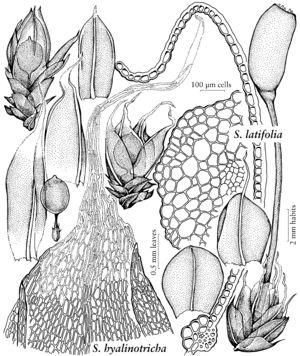Stegonia
Rev. Bryol. 10: 96. 1883 ,.
| Taxon | Illustrator ⠉ | |
|---|---|---|
 | Stegonia latifolia var. latifolia Stegonia hyalinotricha | Patricia M. Eckel Patricia M. Eckel |
Plants gregarious, bulbiform, white to whitish green distally, brown proximally. Stems to 3 mm; hyalodermis absent, sclerodermis absent, central strand present; axillary hairs ca. 3–6 cells in length, proximal 2 cells firm-walled. Leaves appressed when dry, appressed or loosely involute distally, weakly spreading when moist; nearly circular to very broadly ovate, sometimes elliptic, adaxial surface deeply concave, ca. 1.5–2 mm; base not differentiated, proximal margins not differentiated; distal margins broadly recurved to revolute, occasionally plane or weakly incurved, commonly serrulate near apex, occasionally entire, distal 1/4–1/3 of leaf usually hyaline, of rhomboid thick-walled cells; apex broadly acute or occasionally rounded; costa thin, excurrent as a flexuose hyaline awn or occasionally percurrent or subpercurrent, adaxial epidermal-cells forming a bulging adaxial ridge, adaxial cells shortrectangular, bulliform (bulging, thin-walled), in ca. 3–4 rows, adaxial outgrowths rare, lamelliform, rounded or serrate and papillose; transverse-section round, adaxial epidermis present, of bulliform cells, adaxial stereid band absent, guide cells 2 (often absent distally) in 1 layer, hydroid strand present, large (occasionally absent distally), abaxial stereid band present (occasionally substereid), round in section, abaxial epidermis absent distally, present proximally; proximal cells differentiated across leaf, rectangular, occasionally bulging, little differentiated or to 30 µm wide, to 4: 1, walls of proximal cells often somewhat thicker than distal cells; distal medial cells rhomboid or hexagonal, grading to elongate rhomboid or hexagonal distally, often hyaline distally, 13–22 µm wide, 2–3: 1, 1-stratose; papillae absent, cell-walls usually thin medially and thick-walled near apex, especially on the abaxial superficial walls, convex on both sides. Specialized asexual reproduction absent. Sexual condition monoicous (paroicous or autoicous); perichaetia terminal, interior leaves little differentiated. Seta 0.2–1.2 cm or very short (70–100 µm). Capsule stegocarpous or cleistocarpous, theca exerted, ovate-cylindric and often slightly curved, to 1–2 mm; or immersed, ovate and very shortly apiculate, ca. 0.7 mm, annulus absent or of 2–3 rows of persistent, vesiculose cells; operculum absent or short-rostrate; peristome teeth absent, rudimentary or 16, cleft to near base, occasionally perforate, ligulate, straight, to 125 µm. Calyptra cucullate. Spores 20–45 µm. KOH distal laminal color reaction yellow.
Distribution
w North America, Mexico, Europe, Asia, Africa, Antarctic
Discussion
Species 3 (2 in the flora).
The capsules of Stegonia exhibit a reduction series (R. H. Zander 1993): one species is peristomate, another cleistocarpous, while the third, of northern Africa, is stegocarpous but eperistomate. Both species in the flora area have perichaetial leaves with a leaf apex of hyaline, elongate, rectangular cells (this variable in S. latifolia) similar to that of the arctic Hilpertia velenovskyi, but smaller, proximal leaves similar to those of Tortula acaulon.
1 Seta (2–)4–12 mm; capsule stegocarpous, exerted, ovate-cylindric, to 1–2 mm 1. Stegonia latifolia
Selected References
None.
Lower Taxa
Key
| 1 | Seta (2-)4-12 mm; capsule stegocarpous, exerted, ovate-cylindric, to 1-2 mm. | Stegonia latifolia |
| 1 | Seta 0.07-0.1 mm; capsule cleistocarpous, immersed, ovate, ca. 0.7 mm. | Stegonia hyalinotricha |